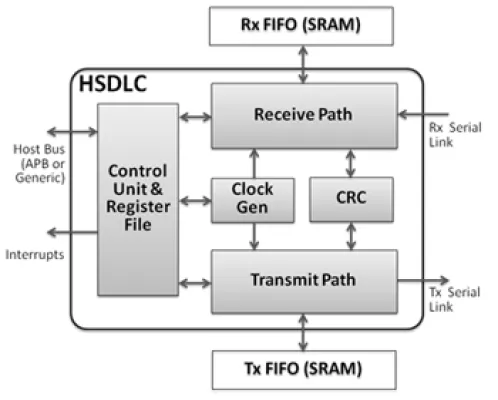The HSDLC IP core implements a controller for the High-Level Data Link Control (HDLC) and the Synchronous Data Link Control (SDLC) protocols. It is based on the Intel 8XC152 Global Serial Channel (GSC) working in SDLC mode, and adds features to support HDLC or proprietary frame transmission under host processor control.
The core operates as a peripheral to a host processor, and is easy to integrate with both modern and legacy processors. Control and status registers are accessible via an APB or a generic 80c51-like bus interface, and a comprehensive set of interrupt signals facilitates interrupt-based operation.
The controller’s great flexibility enables a variety of serial link setups. It provides two independent interfaces, one for transmitting and one for receiving data. Both interfaces provide control signals for the link drivers to support both full- and half-duplex operation. The controller can be programmed to use hardware flow control signals (RTS/CTS) and it can also detect collisions. The baud-rate is programmable and limited only by the link drivers and the core’s clock frequency. The core derives the receive clock from the received serial data, or uses an externally provided receive clock.
The HSDLC controller core is designed for reuse and is rigorously verified and scan-ready. Although designed to manage serial links, the core contains no latches or tri-states, and is fully synchronous with a single clock domain. The core is available in Verilog RTL or as a targeted FPGA netlist. Deliverables provide everything required for a successful implementation, including sample scripts, an extensive testbench, and comprehensive documentation.
HDLC & SDLC Protocol Controller
Overview
Key Features
- Controller for both the SDLC and HDLC (ISO 13239) transmission protocols
- Based on the Intel 8XC152 Global Serial Channel (GSC), operating in SDLC Mode
- Additional features support HDLC and proprietary serial protocols.
- Flexible Frame Formatting
- Programmable preamble pattern and preamble length
- Programmable inter-frame space
- Single- or double-byte address field
- Address filtering allowing multicast and broadcast
- Raw transmit and receive testing modes
- Back-to-back transmit & back-to back receive
- NRZ, NRZI, Bi-Phase-S, and Manchester Data Encoding
- Bit Stuffing and Bit Stripping
- 16-bit (CRC-16, CCITT or IBM) and 32--bit (CRC-32) frame check sequence
- CRC, Bit-stuffing/stripping, and abort and idle sequences detection can be independently enabled/disabled
- Flexible Serial Link Interface
- Full or Half Duplex
- Programmable Baud Rate
- Modem Controls (RTSn/CTSn)
- Collision detection
- Internal baud generator, or external transmit clock with strobe
- Automatic receive clock recovery, or external receive clock with strobe
- Easy to Integrate
- Suitable for interrupt-based or polling-based operation
- Configurable size, Transmit & Receive FIFOs
- 80xc152-like control-status registers
- APB or Generic MCU-like Host Interface
Block Diagram

Applications
- The HSDLC controller core be used in telecommunication equipment supporting HDLC-based protocols such as X.25 or ISDN-D. It can also be used to implement serial interfaces between processors and peripherals.
Deliverables
- Synthesizable Verilog RTL or FPGA netlist
- Testbench & sample test cases
- Simulation & synthesis scripts
- Documentation
Technical Specifications
Maturity
Production Proven
Availability
Now
Related IPs
- Used for controlling HDLC/SDLC transmission protocols
- 10G/2.5G/1G Multi-Speed Ethernet Controller IP for Automotive Applications
- 400G/800G High Speed Ethernet Controller MAC/PCS/FEC
- Single Channel HDLC Controller
- Link Protocol Engine
- Licensable baseband controller core + Licensable upper and lower protocol stacks